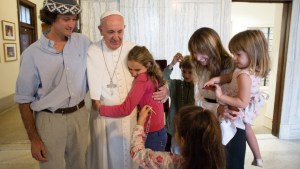True or false?
Happy families are all alike; every unhappy family is unhappy in its own way. (Leo Tolstoy)
It’s a good time to ask that question, what with folks having gathered with family for the Christmas season. It’s been on my mind for a long time, especially recently, as I reflect upon how I’ve seen spouses, parents, and children treat each other. Bottom Line Up Front: I’ve been pained, even scandalized, by how family members treat each other. (And I’m very hard to scandalize!)
Let me offer some illustrations: My parents were as human as anyone—with real strengths and weaknesses. Yet in 53 years of marriage, they were consistent in their reverence for each other. I grew up taking for granted that there were certain tones and words that spouses just don’t use with each other. Consequently, it stuns and saddens me when spouses, who pledged at the altar of God to love as Christ and the Church love each other, speak to each other with contempt and bitterness. In doing so they plant fertile and long-lasting seeds of resentment.
I’ve seen parents who always ensured that their children were fed, clothed, and schooled, parents who never raised a violent hand against their children, slay their children’s souls, simply for the “fault” of being children. That is, children, who, by virtue of being children made noise, made messes, or cost money, and were shamed for those inevitable “side effects” of being children. Perhaps worse, I’ve seen parents unable (or at least unwilling) to acknowledge the fine young adults their children had become. As a professor, I was often tempted to say, “I could die and go to God with a clear conscience if I had raised young adults as noble as your kids have become—why not praise them?”
I’ve also known parents who were attentive, loving, sacrificial, and wise, whose children treated them as if they were disappointing hired help. “But what have you done for me lately?” I’m thinking of a young teen who made her parents’ lives a misery because they wouldn’t allow her to spend every waking moment on Instagram. How is that possible?
On and on it goes. I think of newlyweds speaking of divorce after less than a month of marriage. Senior couples reliving resentments like savoring a vintage wine. Parents and children treating each other as competitors for whatever happiness they think they are entitled to. I know that such behaviors, and the consequent effects on the human soul, are not what God intends.
About a month ago I became so distressed and disturbed by what I had seen in families that I called my spiritual father to discuss it with him. “Pop, you and Nanny have been married over 60 years. Just like my parents, I know that there are some ways that you would never speak to each other. Yet some spouses do so easily. Why?”
His answer rang true: “Son, they haven’t converted to Christ. They haven’t yielded their sin to him; they haven’t asked for his grace; they haven’t committed to loving as he loves—which requires embracing Christ’s cross. Love can’t grow in a heart where sin reigns.”
Pop’s wisdom helps us to look at Tolstoy’s quote in a new light. Happiness is found where love is at work, and love works and grows in the soil where the cross of Christ has been planted. Sin grows like a weed, choking off the good fruits of love and grace. The paradox of sin is that it seems to just grow on its own, its full effects taking us unawares. Yet sin is a “high-maintenance” crop—it must be fed and watered with resentment, gripes, spite, and self-pity.
Tolstoy is right in this way: happy families, families wherein the members are striving to be conformed to Christ, are happy because they love as Christ loves. Yet Tolstoy was only partly right: happy families are unique, inasmuch as they contain unique individuals who strive to love in a Christ-like manner within their unique set of circumstances.
Tolstoy is also right in this way: unhappy families each live a distinctive misery, as they are composed of unique individuals who sin in their own way, as their distinctive circumstances may allow. Yet Tolstoy was only partly right: unhappy families are all alike, inasmuch as they are unhappy because they reject receiving and giving Christ’s love.
As we move into the New Year, before we forget New Year’s Resolutions, let’s undertake an examination of conscience. Then let’s recall Acts 16:31, “Believe in the Lord Jesus, and you will be saved, you and your household.”
When I write next, I will offer a series of reflections on recent ups and downs of culture. Until then, let’s keep each other in prayer.


